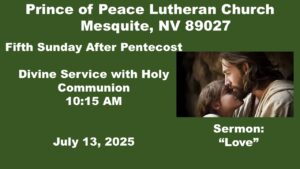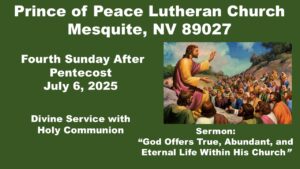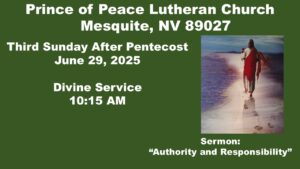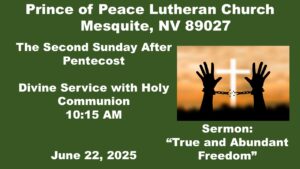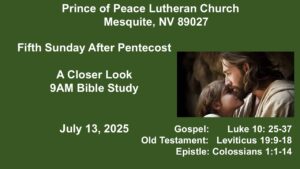THE FIFTH SUNDAY AFTER PENTECOST
13 July 2025
Leviticus 19:9-18
Colossians 1:1-14
Luke 10:25-37
Jesus is Our Good Samaritan
The Law commands that “you shall love the Lord your God” with all your heart, soul, mind and strength (Luke 10:27), and that you shall “love your neighbor as yourself” (Lev. 19:18). Love fulfills the Law because love does no harm to the neighbor. Christ Jesus is the Good Samaritan, who with divine compassion saves you from all evil. He takes your sin and death upon Himself and bears these in His body to the cross. He binds up your wounds with the healing balm of His Gospel, and He brings you into His Church, where He takes care of you at His own expense (Luke 10:34–35). By such mercy, He proves “to be a neighbor to the man who fell among the robbers” (Luke 10:36). Therefore, “you go, and do likewise” (Luke 10:37). By “your faith in Christ Jesus” and “because of the hope laid up for you in heaven” (Col. 1:4–5), you have the same love for others as the Lord Jesus has for you.
Sermon: “Love”
THE FOURTH SUNDAY AFTER PENTECOST
6 July 2025
Isaiah 66:10-14
Galatians 6:1-18
Luke 10:1-20
The LORD Grants Peace and Life to His Church
The LORD restores Jerusalem, His Church, because she is the mother of His children, whom He comforts “as one whom his mother comforts” (Is. 66:13). We are “satisfied from her consoling breast” with the pure milk of the Word, and we “drink deeply with delight from her glorious abundance” (Is. 66:11). The messengers of Christ bestow such gifts upon His Church. For He sends them out “as lambs in the midst of wolves” (Luke 10:3), bearing in their bodies the sacrifice of His cross, by which “the kingdom of God has come near” (Luke 10:9, 11). Wherever He enters in with this Gospel, Satan is cast out and falls “like lightning from heaven” (Luke 10:18). Thus, we do not “boast except in the cross of our LORD Jesus Christ” (Gal. 6:14). Rejoicing in this Gospel, we “bear one another’s burdens” in love, according to “the law of Christ” (Gal. 6:2).
Sermon: “God Offers True, Abundant, and Eternal Life Within His Church”
THE THIRD SUNDAY AFTER PENTECOST
29 June 2025
1 Kings 19:9b-21
Galatians 5:1, 13-25
Luke 9:51-62
Christ’s Messengers Proclaim His Kingdom
When the prophet Elijah became discouraged and despaired of his life, “the word of the Lord came to him” (1 Kings 19:9b) and stood him “on the mount before the Lord” (1 Kings 19:11). The Lord made Himself known to the prophet — not in the impressive power of gale force winds, or in an earthquake, or in the fire, but in “the sound of a low whisper” (1 Kings 19:12). Today God reveals Himself to us through the frail preaching of the Gospel. The Son of Man sends “messengers ahead of him … to make preparations for him” (Luke 9:52). Putting their hand to that plow of preaching, they “go and proclaim the kingdom of God,” and they do not look back (Luke 9:60, 62). What they preach is not the power of the Law with its “yoke of slavery,” but the power of God unto salvation through the Gospel of forgiveness, by which “Christ has set us free” (Gal. 5:1).
Sermon: Authority and Responsibility
THE SECOND SUNDAY AFTER PENTECOST
22 June 2025
Isaiah 65:1-9
Galatians 3:23-4:7
Luke 8:26-39
Jesus Brings Release from the Bonds of Sin, Death and the Devil
The LORD finds those who did not seek Him or ask for Him. He spreads out His hands “to a rebellious people” (Is. 65:2) and calls them to be His people and to dwell in peace upon His holy mountain (Is. 65:9). For wherever Jesus Christ enters in, Satan is cast out. Those who were enslaved and driven mad by the assaults and accusations of the devil are set free by the Word of Christ. He drowns and destroys the old Adam in us with the waters of Holy Baptism and thereby brings us out of death into life. No longer naked in our shame, living “among the tombs” (Luke 8:27), we are brought into the LORD’S house, fully clothed by Christ; He has come in “the fullness of time” (Gal. 4:4) to fulfill the Law on our behalf and to redeem us from its every accusation. Therefore, having been justified by His grace through faith in His Gospel, “you are no longer a slave, but a son” (Gal. 4:7).
